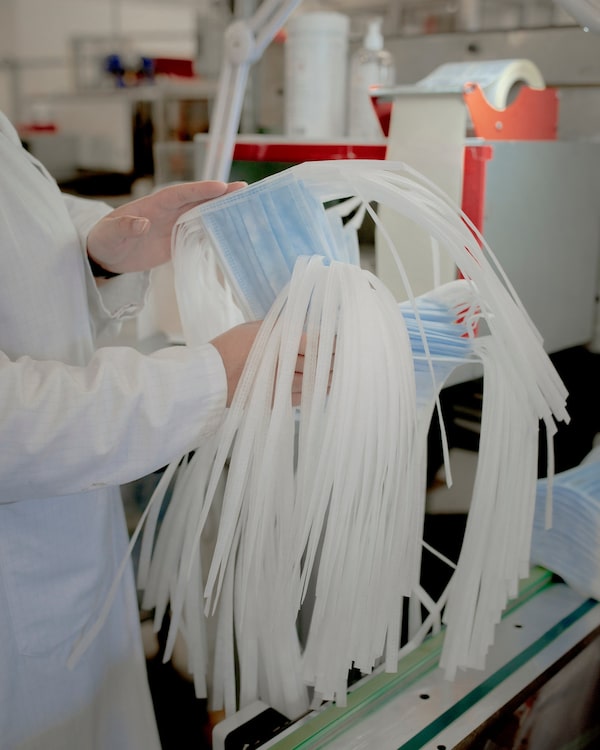
AMD Medicom Inc. will supply 30 million to 50 million surgical and fine particle-blocking N95 masks a year to Ottawa under a long-term agreement.Courtesy of manufacturer
A Canadian-based medical mask supplier is significantly expanding manufacturing operations at home and around the world as countries hoard supplies amid a pandemic-induced shortage.
AMD Medicom Inc., which is based in Pointe-Claire, Que., is aiming to open its first mask factory in Canada by July. It will supply 30 million to 50 million surgical and fine particle-blocking N95 masks a year to Ottawa under a proposed long-term agreement, generating $10-million to $20-million in annual sales.
The private company currently makes masks in China, Taiwan, France and the United States.
“It is forcing us to reinvent ourselves … and think a bit differently,” said Guillaume Laverdure, Medicom group president and chief operating officer.
Innovation, Science and Industry Minister Navdeep Bains has said Ottawa will fund the facility’s startup costs, part of a move to ensure the country is never again caught short if global mask demand explodes.
Mr. Laverdure said the company, which sells in 90 countries, is also “significantly” expanding production at existing factories by two to 10 times. And it’s talking to governments in Asia, Europe, Africa and North America to open up to four more mask factories by fall for domestic markets.
“Setting up factories is not something we do every day,” he said. “We can’t be in 90 countries to manufacture overnight, so we’ll see. The crisis is teaching us there is an absolute necessity to have access to some product any time, no matter the conditions."
The company has been navigating quickly shifting circumstances as countries take “beggar-thy-neighbour”-styled measures to grab onto what precious mask supplies they can.
“It is an extremely competitive space right now for personal protective equipment,” federal Health Minister Patty Hajdu said last week. “We are pulling out all stops … trying to procure equipment in a global situation where equipment is extremely tight.”
Medicom found itself earlier this year unable to send international-bound masks made in its Asian and French factories after host governments either prohibited their export or requisitioned their output for local use.
Coronavirus guide: Updates and essential resources about the COVID-19 pandemic
‘Can I take my kids to the park?’ And more coronavirus questions answered by André Picard
Several other countries have also banned the export of masks or other essential medical equipment, including Germany, South Korea, the Czech Republic and Russia. The U.S. stopped the export of N95 masks made by 3M Co. to Canada last week.
Those actions have exposed weaknesses in the global supply chain system after decades of offshoring of manufacturing of many items including masks to low-cost countries, and have raised geopolitical tensions.
On Friday, Prime Minister Justin Trudeau warned the U.S. that stopping mask exports to Canada would “end up hurting Americans” as much as others. On Sunday, he signalled that he preferred to resolve the situation through talks rather than retaliatory measures.
Paul Deegan, former deputy executive director of then-U.S. president Bill Clinton’s national economic council, said the pandemic will lead to “much more nearshoring of essential health-related items. We need more national critical capacity in Canada. It [could] become more difficult to do business internationally."
Mr. Laverdure said while he expects export bans to ease off, those measures “do [put into] question our business model of relying on one host country with a long supply chain versus ensuring we have proper safety stock or local access to products in a country.”
Medicom began sending masks to Canada last week from inventory stored in 11 countries. Mr. Laverdure said one result of opening multiple facilities will be a double-digit cost increase.
“It’s a tradeoff,” he said. “You can’t only look at the budget line. Proximity, guarantee of service and access to products are probably more important … that’s a bit of a priority shift. In the past it was more low-cost, low-inventory, just-in-time delivery.”
Medicom was founded in 1988 by CEO Ronald Reuben to import gloves needed by health-care workers during the HIV epidemic. It later expanded into supplying other personal protective equipment. It has 1,100 employees worldwide and generates more than $500-million in sales.
Medicom experienced demand surges during the SARS, H1N1 and Ebola epidemics and has already secured machinery and raw materials in anticipation of finalizing the deal with Canada, Mr. Laverdure said. “This is our business, we know what to do.”
Christopher Mio and Meghan Hoople found themselves jobless and wanting to help in the wake of COVID-19 isolation in Toronto. After flyering their neighbourhood with a free-of-charge offer, they received an outpouring of support and requests from people in need.
The Globe and Mail
Sign up for the Coronavirus Update newsletter to read the day’s essential coronavirus news, features and explainers written by Globe reporters.